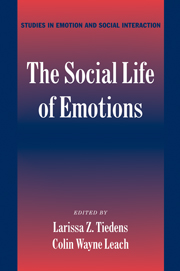Book contents
- Frontmatter
- Contents
- Acknowledgements
- List of Contributors
- The Social Life of Emotions
- Introduction: A World of Emotion
- PART I THE INTERPERSONAL CONTEXT
- PART II THE INTRAGROUP CONTEXT
- PART III THE INTERGROUP CONTEXT
- 11 Intergroup Emotions
- 12 Intergroup Contact and the Central Role of Affect in Intergroup Prejudice
- 13 Judgments of Deserving and the Emotional Consequences of Stigmatization
- 14 Group-based Emotions and Intergroup Behavior
- 15 Interpreting the Ingroup's Negative Actions Toward Another Group
- 16 Intergroup Schadenfreude
- Index
- References
14 - Group-based Emotions and Intergroup Behavior
The Case of Relative Deprivation
Published online by Cambridge University Press: 01 April 2011
- Frontmatter
- Contents
- Acknowledgements
- List of Contributors
- The Social Life of Emotions
- Introduction: A World of Emotion
- PART I THE INTERPERSONAL CONTEXT
- PART II THE INTRAGROUP CONTEXT
- PART III THE INTERGROUP CONTEXT
- 11 Intergroup Emotions
- 12 Intergroup Contact and the Central Role of Affect in Intergroup Prejudice
- 13 Judgments of Deserving and the Emotional Consequences of Stigmatization
- 14 Group-based Emotions and Intergroup Behavior
- 15 Interpreting the Ingroup's Negative Actions Toward Another Group
- 16 Intergroup Schadenfreude
- Index
- References
Summary
When researchers discuss relative deprivation (RD), they refer to the perception of an undeserved disadvantage, the accompanying emotions, and associated action tendencies. People who notice an unfair relative disadvantage might feel a variety of emotions, including disappointment, depression, surprise, envy, anger, resentment and outrage (Corning, 2000; Folger, 1986, 1987; Mikula, Petri, & Tanzer, 1990). This list of possible emotions raises two questions. First, are some of these emotions more typical than others as a reaction to a perceived unfair disadvantage? Second, what conditions determine which of these emotions are felt? According to cognitive appraisal theories of emotion (Frijda, 1993; Ellsworth, 1994; Roseman, Spindel, & Jose, 1990), people's perceptions or cognitive appraisals of the situation shape how they will feel. The purpose of this chapter is to explore a variety of appraisal dimensions that may distinguish among the various RD emotions. We believe that a closer examination of the specific emotions elicited by perceptions of unfair disadvantages will clarify the relationship between perceptions of RD and subsequent behavioral reactions. We describe the important complexities that emerge as we consider five appraisal dimensions proposed by RD theorists as antecedents of RD: (1) the legitimacy of the intergroup context, (2) who is responsible for the disadvantage, (3) feasibility of any change, (4) social support, and (5) social comparisons. Finally, we discuss whether the cognitive appraisals we describe: (1) cause feelings of deprivation, (2) are the cognitive components of the deprivation experience, or (3) are the consequence of feeling deprived.
- Type
- Chapter
- Information
- The Social Life of Emotions , pp. 292 - 313Publisher: Cambridge University PressPrint publication year: 2004
References
- 27
- Cited by



